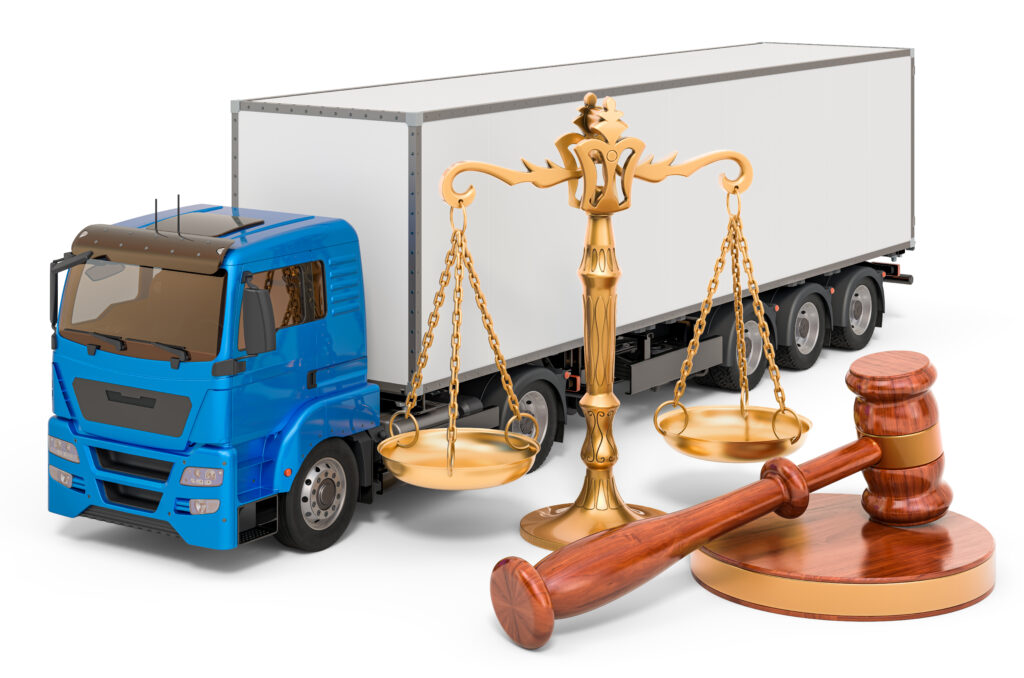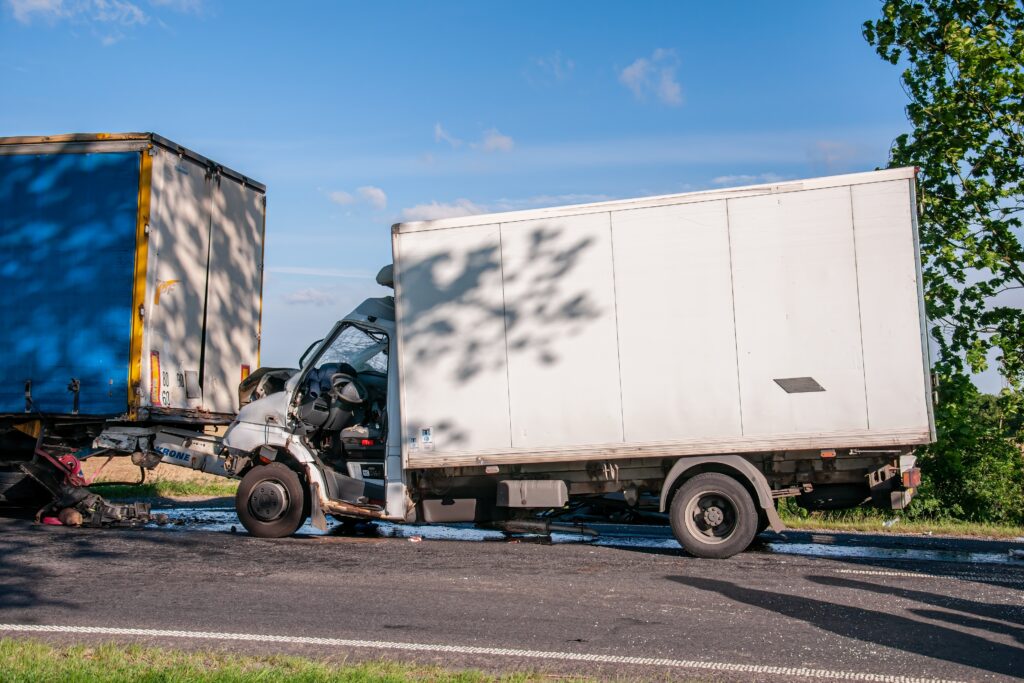When truck drivers and trucking companies violate FMCSA regulations or otherwise behave negligently, they may cause serious accidents that lead to debilitating injuries for others. An accident victim’s attorney can sometimes settle a case with a truck driver or trucking company’s insurer. However, in other cases, litigation may become necessary.

Litigation begins when an accident victim’s lawyer files a lawsuit in the state court system. After filing suit, the parties may continue their settlement negotiations or take their case to a jury trial or alternative dispute resolution (ADR) proceeding.
You always want a San Antonio truck accident attorney with litigation experience in case you require a truck accident lawsuit to obtain the full compensation you deserve.
[toc_block title=”Table of Contents”]
Truck Driver and Trucking Company Negligence That Causes Accidents
Truck driver and trucking company negligence can manifest in different ways, contributing to serious accidents on the road. Examples of truck driver and company negligence include the following:
- Driver Fatigue — One common type of negligence is driver fatigue. When truck drivers exceed the permissible hours of service that regulations mandate, they compromise their alertness and reaction times, significantly increasing the risk of accidents. Fatigued driving often results from unrealistic delivery schedules that trucking companies impose, putting both the driver and other road users at risk.
- Inadequate Training — Inadequate training is another prevalent form of negligence. When trucking companies fail to provide comprehensive and ongoing training to their drivers, this can lead to a lack of proficiency in handling large commercial vehicles. Insufficient training on safety procedures, defensive driving, and the proper use of equipment may contribute to accidents resulting from the driver’s inability to navigate challenging road conditions or respond appropriately to emergencies.
- Negligent Hiring — Trucking companies’ negligent hiring practices also pose a significant risk. If companies fail to conduct thorough background checks, verify a driver’s qualifications, or assess their driving history, they may unknowingly employ individuals with a history of accidents, traffic violations, or substance abuse issues. This negligence in hiring can lead to accidents involving drivers with a documented history of unsafe behavior.
- Inadequate Maintenance — Inadequate vehicle maintenance is a direct form of trucking company negligence. When companies neglect routine inspections, repairs, and maintenance of their fleet, they increase the likelihood of mechanical failures on the road. Brake malfunctions, tire blowouts, and other mechanical issues can result in catastrophic accidents that pose a danger to everyone sharing the road.
- Delivery Schedules — Pressure to meet tight delivery schedules can contribute to negligent behaviors of both truck drivers and trucking companies. Drivers may engage in speeding, reckless driving, or violations of hours-of-service regulations to meet demanding timelines the company imposes. This creates a hazardous environment, heightening the risk of accidents.
- Load Securement — Negligence in load securement is another common factor leading to accidents. When trucking companies or drivers fail to properly secure cargo, it can shift or spill, causing the driver to lose control of the vehicle. Improperly secured cargo poses a serious risk to other motorists and can lead to devastating accidents.
Injuries in Truck Accidents

Victims of commercial truck accidents often endure a range of mental and physical injuries because of truck driver or trucking company negligence. One of the most common injuries is traumatic brain injury(TBI), resulting from the forceful impact of the collision. TBIs can lead to cognitive impairment, memory loss, and other neurological complications, significantly affecting the victim’s life.
Spinal cord injuries are also prevalent in truck accidents, causing damage to the spinal cord and potentially resulting in partial or complete paralysis.
Orthopedic injuries, such as dislocations and fractures, are also frequent, often causing limited mobility, severe pain, and the need for extensive medical intervention and therapy. Furthermore, soft tissue injuries, including muscular strains and sprains, are common due to sudden and forceful movements during a truck accident. These injuries can cause pain, swelling, and prolonged recovery periods.
Internal injuries resulting from blunt force trauma can lead to internal bleeding or organ dysfunction, necessitating immediate medical attention. Burn injuries are another risk, particularly when the truck carries hazardous chemicals and other materials. Fires or explosions can bring about severe burns, requiring ongoing medical care, surgeries, and long-term rehabilitation for victims.
In addition to physical injuries, truck accidents often result in various mental health challenges for victims. Post-traumatic stress disorder (PTSD) is a common psychological injury arising from the emotional trauma of an accident. Victims may experience persistent flashbacks, anxiety, and difficulty coping with daily life. Depression and anxiety disorders can also develop due to the significant life changes resulting from injuries sustained in the accident. The repercussions on the victim’s ability to work, engage in daily activities, and maintain relationships with others can significantly contribute to mental health struggles.
Chronic pain syndrome is another mental and physical consequence of truck accidents. Severe injuries may lead to persistent pain, affecting the victim’s overall well-being and requiring ongoing medical management.
Victims of commercial truck accidents may suffer a range of mental and physical injuries due to the negligence of truck drivers or trucking companies. These injuries include traumatic brain injury, spinal cord injuries, orthopedic injuries, soft tissue injuries, internal injuries, burn injuries, PTSD, depression, anxiety disorders, and chronic pain syndrome.
When to Litigate a Truck Accident Case in the Court System

Litigating a truck accident case resulting from the negligence of a truck driver, trucking company, or another party involves careful consideration of numerous factors; the timing of initiating litigation is crucial. Once the victim decides to pursue legal action, prompt action is often advisable to preserve evidence and adhere to legal timelines.
The first step is to seek ongoing medical attention for injuries sustained in the truck accident. Prompt, ongoing medical treatment can help to establish a clear link between the accident and the resulting injuries, strengthening the causation aspect of the case.
Engaging legal representation early on in the process is also crucial. Experienced personal injury attorneys specializing in truck accident cases can provide valuable guidance on the next steps. They can assess the merits of the case, advise on the potential legal strategies, and gather necessary evidence.
Investigating the accident thoroughly is a priority. This involves obtaining police reports, witness statements, and available surveillance footage. Preservation of physical evidence, such as vehicle damage and road conditions, is crucial. Promptly collecting this evidence diminishes the risk of loss or deterioration.
Communicating with insurance companies, both the victim’s and the at-fault party’s, is a key step. However, exercising caution during these interactions is essential to avoid statements that might come back on the victim later. Legal counsel can guide the victim in navigating these communications and negotiating with insurance companies to secure fair compensation.
Filing the lawsuit within the statute of limitations is also critical. Statutes of limitations vary according to jurisdiction, and failure to initiate legal action within the specified timeframe can result in losing the right to pursue a claim. Therefore, timely filing is imperative to protect the victim’s legal rights.
The attorneys for both parties often attempt to negotiate a settlement before going to trial. Legal professionals engage in discussions with the at-fault party’s representatives to reach a fair settlement that adequately compensates the victim for damages. The case proceeds to litigation if the parties cannot reach a settlement.
Litigation involves the formal legal process, including discovery, depositions, and potentially a trial. This stage allows both parties to present their evidence, question witnesses, and make legal arguments. The goal is to secure a favorable judgment that holds the negligent party accountable and compensates the victim for their losses.
Litigating a truck accident case requires swift action to preserve evidence, seek medical attention, engage legal representation, and begin the legal process.
What Happens at a Truck Accident Trial or ADR Hearing?
At a truck accident trial or alternative dispute resolution (ADR) proceeding, the legal process unfolds as both parties present their cases before the court or designated neutral party. These proceedings aim to determine liability and assess damages for the truck accident due to negligence.
During a trial, attorneys for the plaintiff (the accident victim) and the defendant (often the trucking company or at-fault truck driver) present their evidence, call witnesses, and make legal arguments before a judge and possibly a jury. This involves a detailed examination of the facts surrounding the accident, the resulting injuries, and the alleged negligence of the at-fault party. The accident victim’s attorney often engages expert witnesses, such as an accident reconstruction specialist or medical professional, to provide specialized insights and opinions.
Cross-examination plays a crucial role during the trial. Attorneys can question witnesses that the opposing party presents, challenging their credibility and scrutinizing the evidence they present. This phase aims to uncover inconsistencies or weaknesses in the opposing party’s case, contributing to the overall legal strategy.
During alternative dispute resolution, which can include mediation or arbitration, both parties engage in negotiations that a neutral third party facilitates. Mediation involves a mediator’s guiding discussions between the parties to reach a voluntary settlement. In arbitration, the neutral arbitrator assesses the evidence and renders a binding decision. In both scenarios, the focus is on resolving the dispute without needing a formal trial.
Evidence is a principal component in both trial and ADR proceedings. The parties present documentation such as medical records, accident reports, and expert opinions to support their arguments. Both parties may also employ photographs, videos, and any other relevant visual evidence to enhance the understanding of the accident scene and the extent of injuries.
Closing arguments allow attorneys to summarize their cases, emphasize key points, and urge the judge or neutral party to rule in favor of their client.
The judge or neutral party deliberates on the evidence presented and issues a decision. In a trial, a judge may render a judgment, determining liability and awarding damages if applicable. In ADR proceedings, the neutral party’s decision is binding in arbitration or serves as a basis for a settlement agreement in mediation.
The outcome of the trial or ADR proceeding significantly affects the compensation awarded to the victim. It is a pivotal moment that concludes the legal process, offering resolution and closure to the parties involved in the truck accident case.
Recovering the Compensation You Deserve Following a Truck Accident
Victims of commercial truck accidents pursuing personal injury claims or lawsuits may be eligible for damages, addressing distinct aspects of their losses.

Economic damages compensate the victim for tangible monetary losses. These damages include compensation for medical expenses incurred due to injuries sustained in the accident. This includes costs related to hospitalization, surgeries, rehabilitation, and any other necessary medical treatments.
Lost income is another category of economic damages, allowing victims to seek compensation for earnings lost during their recovery. Additionally, loss of earning capacity may be recoverable if the injuries result in a diminished ability to earn income in the future. This considers the long-term effects on the victim’s career and financial stability.
In addition, property damage compensation covers the costs of repairing or replacing damaged personal belongings, including the victim’s vehicle. This aspect of economic damages aims to restore the victim to their pre-accident financial state.
Non-economic damages address the accident victim’s intangible losses. For example, pain and suffering damages acknowledge the physical and emotional distress the accident victim has experienced, including the pain endured during and after the accident, along with the mental anguish associated with the injuries. In addition, loss of consortium compensates for the adverse consequences on the victim’s relationships. If the injuries affect the victim’s ability to provide companionship, support, or intimacy to their spouse, they may seek compensation for the strain on the relationship. Compensation for the loss of the ability to use an injured body part is another type of non-economic damage that addresses the specific effects on the victim’s mobility and functionality. This category of damages recognizes the impairment and any associated challenges resulting from the injury.
An accident victim may also pursue punitive damages in cases where the at-fault party’s conduct was particularly egregious. These damages go beyond compensating the accident victim and serve to punish the wrongdoer and discourage similar behavior in the future.
Victims of commercial truck accidents may recover several types of damages in a personal injury claim or lawsuit. Economic damages include compensation for medical expenses, lost income, and property damage. Non-economic damages cover mental distress, pain and suffering, loss of consortium, loss of quality of life, and loss of the ability to use an injured body part. The injured victim may also seek punitive damages in cases of extreme misconduct. Seeking comprehensive compensation is crucial for addressing the full spectrum of losses a truck accident victim has experienced.

Call a Truck Accident Lawyer in Your Area Today
If you suffered injuries in a truck accident resulting from a truck driver’s, trucking company’s, or other entity’s negligent behavior, you have legal options you can consider. A knowledgeable truck accident attorney in your area can promptly file a claim or lawsuit on your behalf, negotiate with insurance companies, or pursue litigation to an efficient resolution in the court system.
